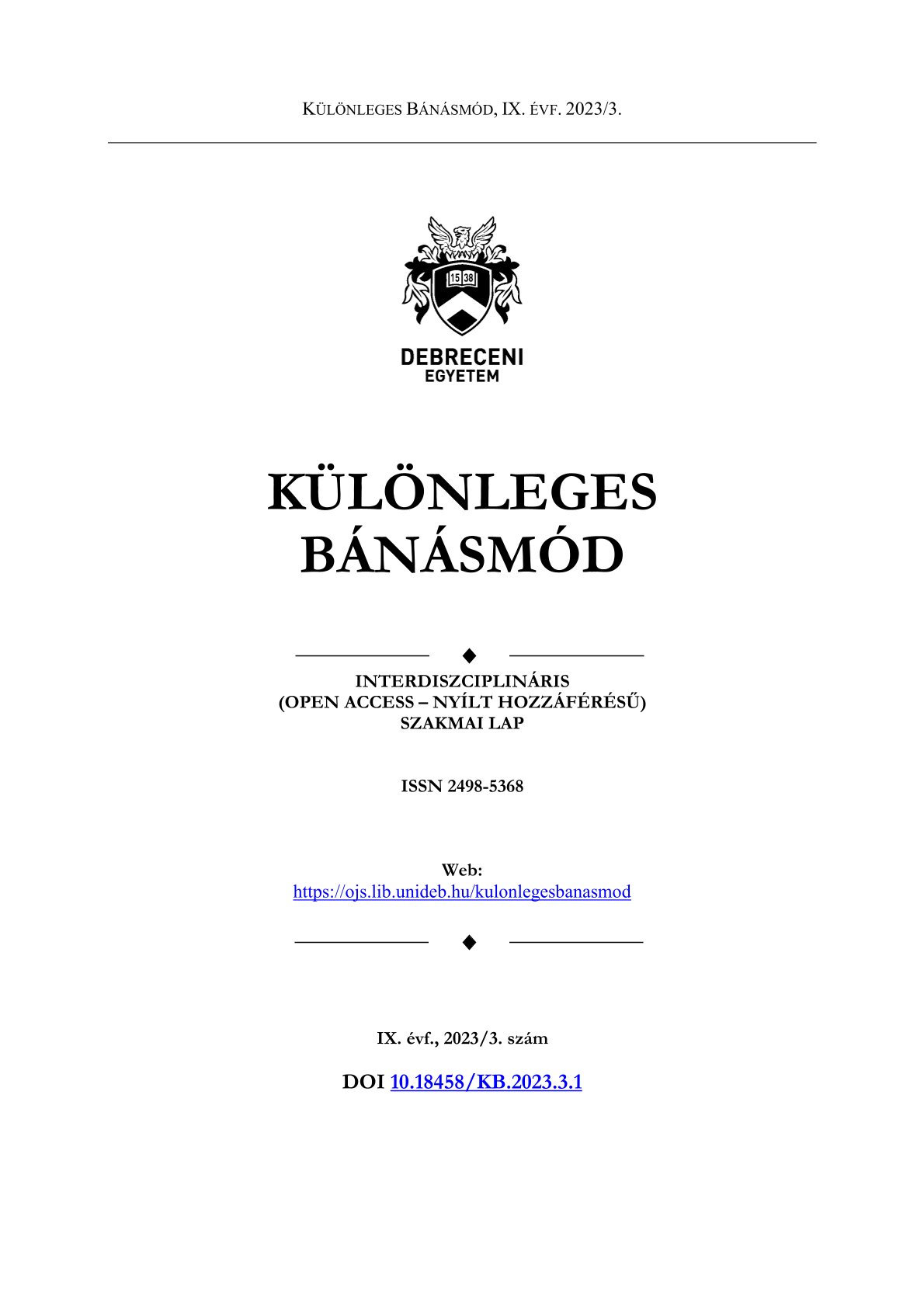DOKTORI KÉPZÉSBEN RÉSZVEVŐ KÜLFÖLDI HALLGATÓK TÁRSADALMI ALKALMAZKODÁSÁNAK FELTÁRÁSA MAGYARORSZÁGON
Szerzők
Megtekintés
Kulcsszavak
Licenc
Copyright (c) 2023 Miranda Hesti, Dr. Markos Valéria

This work is licensed under a Creative Commons Attribution-NonCommercial-NoDerivatives 4.0 International License.
Hogyan hivatkozzuk
Absztrakt
A Magyarországot választó külföldi hallgatóknak alkalmazkodniuk kell a magyar társadalomhoz. A nemzetközi hallgatók, különösen a doktoranduszok társadalmi adaptációjának ismerete újabb perspektívát adott a felsőoktatási társadalmi adaptációnak. A tanulmány célja a külföldi hallgatók magyarországi társadalmi adaptációjának feltárása volt és az, hogy megértsük, hogyan alkalmazkodtak a nemzetközi hallgatók a magyarországi társadalomhoz. A tanulmány módszere kvalitatív vizsgálat, ahol félig strukturált interjúkat alkalmaztunk. A tanulmány a demográfiai adatok leíró statisztikáit is ismerteti. A mintánkban hét nemzetközi diák került, akik Indonéziából, Malajziából, Mianmarból, Üzbegisztánból és Irakból érkeztek. Az interjúk angol nyelven készültek. A tanulmány tizenegy kategóriát azonosít a tanulók alkalmazkodásában. Ezek a személyiség, az első meglátogatott hely, az első barát, az adaptációs típusok, az ismerkedés módjai, az időhöz való alkalmazkodás, a társas alkalmazkodás kihívása, a társadalmi alkalmazkodás tényezője, a társadalmi adaptáció beállítása, az önreflexió, valamint egy ismeretlen tevékenység vagy új szokás.
Hivatkozások
- Alasmari, A. A. (2023). Challenges and social adaptation of international students in Saudi Arabia. Heliyon, 9(5). e16283. DOI 10.1016/j.heliyon.2023.e16283
- AlZboon, S. O. (2013). Social adaptation and its relationship to achievement motivation among high school students in Jordan. International Education Studies, 6(10), 63–69. DOI 10.5539/ies.v6n10p63
- Braun, V., & Clarke, V. (2006). Using thematic analysis in psychology. Qualitative Research in Psychology, 3(2), 77–101. DOI 10.1191/1478088706qp063oa
- Hussain, M., & Shen, H. (2019). A study on academic adaptation of international students in China. Higher Education Studies, 9(4), 80–91. DOI 10.5539/hes.v9n4p80
- Makeeva, E., Kulinich, M., & Yakovleva, I. (2022). Adaptation of International Students: Challenges and Solutions. Journal of Intercultural Communication, 21(3), 41–54. DOI 10.36923/jicc.v21i3.20
- Merenkov, A., & Antonova, N. (2015). Problems of social adaptation of international students in Russia. New Educational Review, 41(3), 122–132. DOI 10.15804/tner.2015.41.3.10
- Misra, R., & Castillo, L. G. (2004). Academic stress among college students: Comparison of American and international students. International Journal of Stress Management, 11(2), 132–148. DOI 10.1037/1072-5245.11.2.132
- Paudel, K. P. (2021). Level of academic performance among faculty members in the context of Nepali higher educational institution. Journal of Comparative & International Higher Education, 13(2), 98–111. DOI 10.32674/jcihe.v13i2.2450
- Pustarnakova, A., Vandysheva, L., & Mitrofanova, S. (2020). Social Adaptation of Foreign Students in Higher Educational Institutions (Case of Samara University). Advance in Social Science, Education and Humanities Research, 392, 185–188. DOI 10.2991/assehr.k.200113.037
- Sandelowski, M. (2000). Whatever happened to qualitative description? Research in Nursing and Health, 23(4), 334–340. DOI 10.1002/1098-240x(200008)23:4<334::aid-nur9>3.0.co;2-g
- Sandelowski, M. (2010). What’s in a name? qualitative description revisited. Research in Nursing and Health, 33(1), 77–84. DOI 10.1002/nur.20362
- Sobkowiak, P. (2019). The impact of studying abroad on students’ intercultural competence: an interview study. Studies in Second Language Learning and Teaching, 9(4), 681–710. DOI 10.14746/ssllt.2019.9.4.6
- Stebleton, M. J., Soria, K. M., & Cherney, B. T. (2013). The high impact of education abroad: college students’ engagement in international experiences and the development of intercultural competencies. Frontiers: The Interdisciplinary Journal of Study Abroad. , 22(1), 1–24. DOI 10.36366/frontiers.v22i1.316
- Terziev, V. (2019b). Social adaptation as an element of social policy. IJASOS-International E-Journal of Advances in Social Sciences, 5(13), 275–282.
- Vershinina, T. S., & Kocheva, O. L. (2015). Adaptation of foreign students to the foreign culture learning environment using the Six Thinking Hats method. International Education Studies, 8(6), 124–131. DOI 10.5539/ies.v8n6p124
- Wu, H., Garza, E., & Guzman, N. (2015). International student’s challenge and adjustment to college. Education Research International, 2015, 1–9. DOI 10.1155/2015/202753
- Yan, S., Li, X., & Yan, T. (2022). The impact of the social adaptability of different groups on the human capital level in an uncertain environment: Panel data analysis based on 35 urban life satisfaction. Frontiers in Psychology, 13(990941), 1–9. DOI 10.3389/fpsyg.2022.990941
- Zerengok, D., Guzel, P., & Ozbey, S. (2018). The Impact of leisure participation on social adaptation of international students. Journal of Education and Training Studies, 6(2), 1–9. DOI 10.11114/jets.v6i2.2680


 https://doi.org/10.18458/KB.2023.3.95
https://doi.org/10.18458/KB.2023.3.95